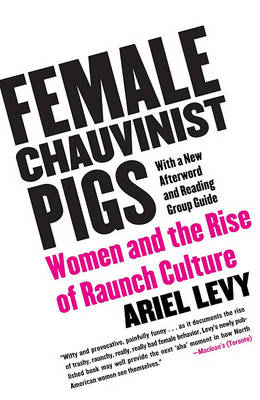
Jo
Written on Aug 27, 2017
There is a way women dance these days. Whether it's with a guy or with their girlfriends. When I see it, it always seems to me that they're not dancing for themselves, they're dancing to be seen - by men. To be noticed. To have an affect on them. There are also female artists, and how they dance these days, in videos and during performances. It's all very sexual, and it's always, even before I discovered feminism, made me uncomfortable. Why do these women want men to see them that way? It's partly because of this that I had wanted to read Female Chauvinist Pigs: Women and the Rise of Raunch Culture by Ariel Levy. But, as fascinating as it is, I was a little disappointed.
This is partly down to me. Female Chauvinist Pigs was published in the UK in 2006, and, being written by an American author, it focuses on America - neither of which I realised when I bought it. So not only is it a little dated, but it's also talking about American pop culture, of which I know very little.
Saying that, it was really fascinating when it came to the history of the American Women's Movement, something I knew nothing about. I loved learning about all the things they achieved until things became divisive between those who were anti-porn, and those who were also part for sexual liberation.
'"Sometimes [there] were emotional defenses of free speech, but to our bewilderment, we also saw that some women identified their sexuality with the S/M pictures we found degrading," Brownmiller wrote. "They claimed we were condemning their minds and behavior, and I guess we were."' (p63)
Levy talks us through the history that led to raunch culture from this divide in the Women's Movement, and how it led to programmes like Girls Gone Wild, and obsession with porn stars, strippers and pole dancing. How people claim women are now sexually liberated to be as sexual as they please, when really, it's all just for the male gaze.
'Why is this the "new feminism" and not what it looks like: the old objectification? [...] The truth is that the new conception of raunch culture as a path to liberation rather than oppression is a convenient (and lucrative) fantasy with nothing to back it up.' (p81 - 82)
As well as the women who are emulating strippers and porn stars, Levy discusses how some women now spurn anything to do with femininity; not wanting to be or liking "girly-girls" (yet perfectly happy to watch said "girly-girls" strip off along with their male friends), and basically linking girl/womanhood with weakness and negativity. Instead, they want to be like, to emulate, men.
'Women who've wanted to be perceived as powerful have long found it more efficient to identify with men than to try and elevate the entire female sex to their level. [...] There is a certain kind of woman--talented, powerful, unrepentant--whom we've always found it difficult to describe without some version of the phrase "like a man," and plenty of those women have never had a problem with that. Not everyone cares that this doesn't do much for the sisterhood.' (p95)
There was one chapter I had some problems with, though. In the chapter From Womyn to Bois, Levy discusses how lesbians present: butch, femme, and the new (at the time) boi. To me, it seems she confuses gender identity and sexuality, as if they are linked; bois like to appear young and boyish, rather than manly, and some even discuss with her the gender binary, and how it doesn't quite work. I don't know if it's the time, and things are understood better now, or if Levy herself just didn't completely understand, but when discussing gender identity and trans men (specifically straight trans men, because she's linking them to lesbians), she seems to not get that trans men were always male:
'But despite the differences between the scene and, say, spring break in South Beach, there are also meaningful similarities in the ways young women across this country, gay and straight, are conceiving of themselves, their bodies, sex, and each other. Women are invested in being "like a man," and in the case of FTMs, women are actually becoming men.' (p138 - emphasis mine.)
The whole chapter, really, made me uncomfortable. It was fascinating at times, but I also feel there is a great deal of lack of understanding - and not just about trans men, but lesbians, too. I could be wrong, but it felt... problematic.
The book overall has really interesting things to say on female sexuality, raunch culture, and what we're obsessed with...
'The women who are really being emulated and obsessed over in our culture now--strippers, porn stars, pinups--aren't even people. They are merely sexual personae, erotic dollies from the land of make-believe. In their performances, which is the only capacity in which we see these women we so fetishize, they don't even speak. As far as we know, they have no ideas, no feelings, no political beliefs, no relationships, no past, no future, no humanity.' (p196)
'[W]e are not even free in the sexual arena. We have simply adopted a new norm, a new role to play: lusty, busty exhibitionist. There are other choices. If we are really going to be sexually liberated, we need to make room for a range of options as wide as the variety of human desire. We need to allow ourselves the freedom to figure out what we internally want from sex instead of mimicking whatever popular culture holds up to as sexy. That would be sexual liberation.' (p200)
...but at the same time, I also felt like it wasn't saying very much in regards to how things can be changed. That last paragraph I quote talks more about what we can do individually, but a lot of this is down to popular culture, and there isn't really anything suggested in how to tackle changing what we see on TV and in magazines. As fascinating as the book was, as much as I agreed with the things Levy was saying, I feel not a huge amount was actually said beyond, "This is the ways things are, this is how we got here, and it's really pretty terrible." I also think it has become quite dated in the 11 years since in was published - although a lot of what Levy says is still relevant, I think, in some ways, things have got worse, that or they're just different here in the UK.
A fascinating read, but more one that wants you to think and change your ways, than trying to inspire you to get out and make a difference.
